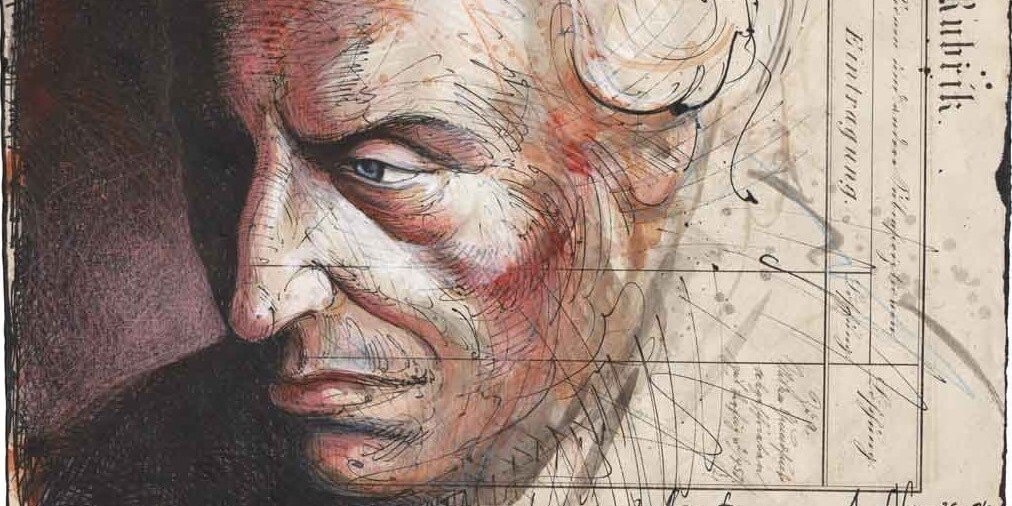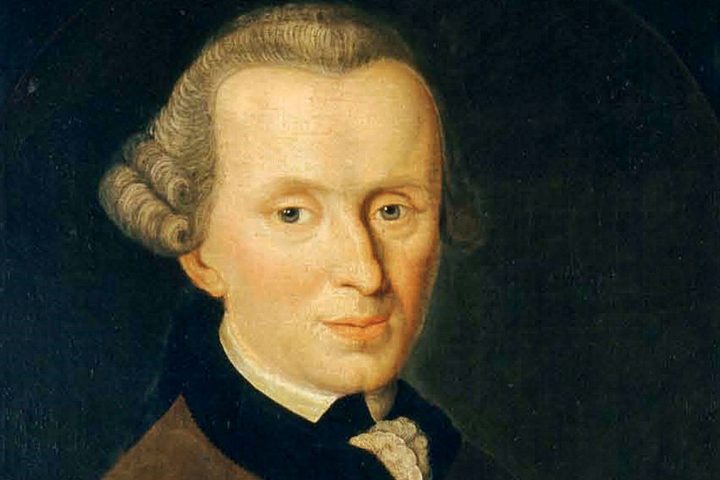Immanuel Kant, born on April 22, 1724, in the city of Königsberg, Prussia, and passed away on February 12, 1804, in the same city. Revered as one of the founding figures of German philosophy, Kant is considered one of the most prominent thinkers of the Enlightenment era. His extensive and systematic works on subjects such as knowledge, reason, metaphysics, ethics, and aesthetics have laid the groundwork for significant philosophical inquiries. Kant introduced crucial concepts like transcendental idealism, a priori knowledge, categorical imperative, and critique of pure reason, which have left a lasting impact on subsequent philosophers and philosophical movements, including Hegel, Schopenhauer, and Neo-Kantianism.
 At the core of Kant’s philosophy lies the endeavor to solidify the foundations of science, uphold the rationality of metaphysics and ethics, and reconcile religion with reason. To achieve this goal, Kant developed his own theory of knowledge called transcendental epistemological idealism, drawing from both Descartes’ rationalism and Hume’s empiricism. According to Kant, knowledge is acquired through both experience and reason. The mind employs certain concepts and principles, known as a priori, independent of experience, to make sense of experience. Kant termed these a priori concepts and principles as categories. He posited that while the reality beyond experience (noumenon) is unknowable to us, we can have a priori knowledge about objects in the realm of experience, termed phenomena. Kant meticulously elaborated on this theory of knowledge in his seminal work “Critique of Pure Reason” (1781/1787).
At the core of Kant’s philosophy lies the endeavor to solidify the foundations of science, uphold the rationality of metaphysics and ethics, and reconcile religion with reason. To achieve this goal, Kant developed his own theory of knowledge called transcendental epistemological idealism, drawing from both Descartes’ rationalism and Hume’s empiricism. According to Kant, knowledge is acquired through both experience and reason. The mind employs certain concepts and principles, known as a priori, independent of experience, to make sense of experience. Kant termed these a priori concepts and principles as categories. He posited that while the reality beyond experience (noumenon) is unknowable to us, we can have a priori knowledge about objects in the realm of experience, termed phenomena. Kant meticulously elaborated on this theory of knowledge in his seminal work “Critique of Pure Reason” (1781/1787).
Another significant aspect of Kant’s philosophy is his grounding of morality in the categorical imperative, a universal and unconditional principle. Kant argued that the source of morality is reason, which dictates human free will. According to him, individuals legislate moral law through their free will. The moral law, a commandment devoid of personal interests, is formulated by Kant as: “Act only according to that maxim whereby you can at the same time will that it should become a universal law.” By anchoring morality in this rational principle, Kant rejected the influence of emotions, passions, traditions, and religion on ethics. He expounded his moral theory in “Critique of Practical Reason” (1788) and “Groundwork of the Metaphysics of Morals” (1785).
Kant also addressed aesthetics, arguing that aesthetic judgments could be objective and universal, determined by a faculty he termed judgment power. He maintained that aesthetic judgments have both sensory and intellectual dimensions but are distinct from moral judgments. Kant presented his aesthetic theory in “Critique of Judgment” (1790).
In the later part of his philosophy, Kant delved into the realms of religion and political philosophy. He advocated for the compatibility of religion with reason, asserting that while the existence of God cannot be proven through reason, morality necessitates belief in God. Kant contended that the essence of religion is morality, but historical and institutional religions corrupt morality. He explicated his philosophy of religion in “Religion within the Boundaries of Mere Reason” (1793). In political philosophy, Kant envisioned eternal peace among nations through universal democracy and international cooperation. He articulated his political philosophy in “Perpetual Peace” (1795).
Kant’s philosophy, marked by concepts such as categorical imperative, a priori knowledge, phenomena, and noumena, has significantly shaped the philosophical landscape. His philosophical ideas have offered a fresh perspective distinct from traditional modes of thought, leaving a profound impact on subsequent philosophical discourse.
Kant’s Epistemological Revolution
Epistemology, or the philosophy of knowledge, became the first philosophy in the true sense with Kant. Henceforth, there is a Copernican Revolution in the Kantian sense.
Just as Copernicus led to a revolution in astronomy by saying that the Earth revolves around the Sun, not the Sun around the Earth, Kant led to a revolution in epistemology by saying that our mind is shaped not by the external world, but the external world is shaped by our mind. Kant developed this understanding against Hume’s radical empiricism and skepticism, which stated that no necessary and universal thought and knowledge could be reached from the external world, i.e. empirical reality.
In Kant’s own words, Hume was the philosopher who awakened him from his dogmatic slumber. Just as Descartes tried to overcome not only the skeptical attitude towards knowledge and faith, but also the dogmatic metaphysics shaped in Scholastic Philosophy, Kant tried to overcome not only Hume’s skepticism, which awakened him from his dogmatic doubts, but also the baseless dogmatism and metaphysics that he thought existed in the philosophy that preceded him.
Kant’s philosophy is a philosophy of criticism, as the titles of his three important books (Critique of Pure Reason, Critique of Practical Reason, Critique of Judgment) suggest. What is criticized in the Critique of Pure Reason, and what is delimited and defined within the framework of this criticism, is knowledge itself. But before moving on to Kant’s answers to the question of what we can know, let us take a closer look at his transformation of epistemology. In general, what was decisive in British Empiricism was the idea that the rationality that prevailed in the rationalist and classical idealist tradition and the emphasis on universality and necessity based on this rationality could not constitute an epistemological beginning and ground.
Rational, i.e. rational thought does not constitute a temporally a priori reality to the experience of life in the context of either the social history of humanity or the development of the individual human being. It is clear that the classical empiricists had a philosophical interest epistemologically focused neither on the history of humanity nor on the spiritual development of the individual. But it is also clear that they were opposed to the idea of innate ideas and agreed that human thinking begins with and is shaped by perceptual experience. In this sense, empiricists also agree that all our knowledge begins with experience and matures on this ground.
Kant, like the empiricists, argues that all our knowledge begins with experience. However, according to Kant, even if all our knowledge is initiated and activated by experience, this does not mean that all of it arises from experience, because experience does not only give us the contents of perception. Experience is also a process, and this process, which refers to time, also activates in us certain mental forms and categories that do not originate in experience. These forms and categories, which are activated and functionalized by the contents of perception, point to the a priori, that is, a priori structure of the human faculty of sensing and thinking.
In the ‘Transcendental Aesthetics’ section of the Critique of Pure Reason, Kant discusses the forms of space and time as a priori forms of sensibility. Although space and time are not directly the contents of our sense perception, they are the a priori forms of all human experience, as the necessary and universal forms or forms of all kinds of perceptual content. In the ‘Transcendental Analytics’ section of the Critique of Pure Reason, Kant discusses the a priori categories of our faculty of understanding. These categories are categorized as quantity, quality, relation and modality and are twelve in number: unity, multiplicity, totality (quantity), reality, negation, limitation (quality), essence, cause, correspondence (relation), possibility, existence, necessity (modality). The concepts in parentheses indicate the class to which the categories grouped in a tripartite manner belong. We have to use the forms of our sensibility to perceive any determination and the categories of our understanding to think and know.
These forms and categories, which are not the directly sensed contents of a particular experience, are necessary for the perception and thinking of sensed contents. In short, for Kant, these forms and categories, which cannot be directly grounded in sensible impressions, carry an epistemological value precisely because of this characteristic. Since these forms and categories are not directly sensible contents, they shape and make intelligible these contents. Kant’s rationalist-based response to Hume’s empiricist skepticism against the truth and reality of universal forms and categories can be expressed in this way.



